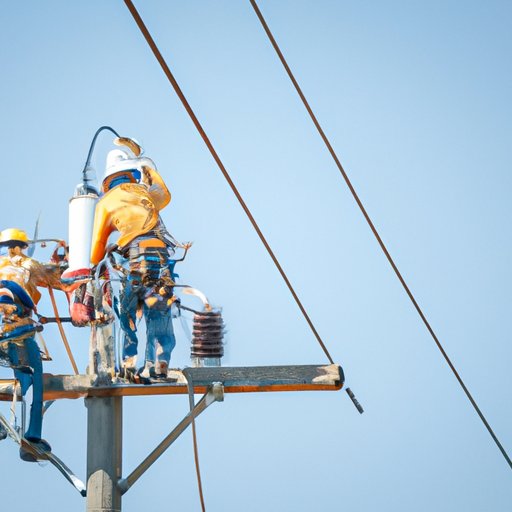
Introduction
If you’ve ever seen a lineman working on a power pole, you know it’s a tough job that requires a unique set of skills. These professionals work to ensure that power lines are installed, maintained, and repaired in a timely and effective manner so that people have the electricity they need. If you’re interested in becoming a lineman, this article will provide you with a comprehensive guide to the training, experience, and insider tips you need to succeed in this challenging and rewarding career.
Steps to Becoming a Lineman: From Training to On-the-Job Experience
To become a lineman, you need to have a combination of training and experience. While there are no specific educational requirements for this job, it’s generally expected that you have a high school diploma or equivalent. You also need to complete a comprehensive lineman training program which covers the safety regulations, tools, and techniques needed to work on power poles and transmission lines. The training program generally lasts anywhere from six to eight months, during which time you will learn how to climb and work on power poles, how to install and maintain power lines, and how to troubleshoot and repair electrical faults.
To get your foot in the door, you need to complete an apprenticeship with an established lineman team. This apprenticeship should last anywhere from two to four years, depending on the program you’re enrolled in. During this time, you will receive hands-on training while working with experienced and licensed linemen. You will learn how to operate the equipment, safely use the tools, and develop all the necessary skills to become a lineman.
The Daily Life of a Lineman: An Insider’s Guide to the Job
The job of a lineman is physically demanding and requires you to work in difficult and sometimes dangerous conditions. You will be working outdoors, sometimes in extreme weather conditions such as extreme heat or severe cold. You need to be in good physical condition, as you will be hauling equipment up and down the poles, climbing, and sometimes working in tight spaces.
The daily tasks of a lineman vary depending on the specific job they’re working on. Some tasks include installing power lines, repairing electrical faults, troubleshooting equipment, or working on new construction projects. This job also requires a great deal of teamwork since you will often be working on a crew to complete a project.
How to Build a Successful Career as a Lineman
If you’re looking to build a successful career as a lineman, it’s essential to continue learning and honing your skills. There are many opportunities for advancement in this industry, ranging from supervising crews to becoming an instructor. Additionally, many linemen go on to become engineers or work in other areas of the power industry.
Salaries for lineman can vary depending on the employer, location, and experience. According to the Bureau of Labor Statistics, the median annual salary for a lineman is around $75,000. Some of the benefits of working as a lineman include job security, growth opportunities, and excellent benefits packages.
The Role of Linemen in the Power Grid: Why Their Work Matters
Linemen play a vital role in the power grid, ensuring that electrical power is delivered safely and efficiently to homes and businesses. These professionals work to maintain the electrical infrastructure, including power lines and transformers. Without their work, the electrical grid would be extremely vulnerable to outages, which would negatively impact public safety and the economy.
What Does It Take to Become a Lineman? An Insider’s Perspective
To gain further insight into the life of a lineman and what it takes to succeed in this career, we spoke with several current and former linemen. Many of them emphasized the importance of climbing and work experience, stating that these skills gave them an advantage when starting their careers. They also stressed the significance of safety on the job and the need for good communication skills while working on a team.
Conclusion
If you’re interested in becoming a lineman, there are plenty of opportunities available to you. With the proper training, skills, and experience, you can have a fulfilling and lucrative career in this industry. Be prepared to work hard, stay safe, and constantly improve your capabilities.




